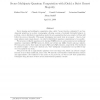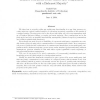31 search results - page 1 / 7 » Secure Arithmetic Computation with No Honest Majority |
TCC
2009
Springer
14 years 4 months ago
2009
Springer
We study the complexity of securely evaluating arithmetic circuits over finite rings. This question is motivated by natural secure computation tasks. Focusing mainly on the case o...
FOCS
2006
IEEE
13 years 10 months ago
2006
IEEE
Secret sharing and multiparty computation (also called “secure function evaluation”) are fundamental primitives in modern cryptography, allowing a group of mutually distrustfu...
CORR
2008
Springer
13 years 4 months ago
2008
Springer
We present three voting protocols with unconditional privacy and information-theoretic correctness, without assuming any bound on the number of corrupt voters or voting authorities...
CRYPTO
2010
Springer
13 years 5 months ago
2010
Springer
Multiparty computation protocols have been known for more than twenty years now, but due to their lack of efficiency their use is still limited in real-world applications: the goal...
STOC
2004
ACM
14 years 4 months ago
2004
ACM
We show how to securely realize any multi-party functionality in a way that preserves security under an a-priori bounded number of concurrent executions, regardless of the number ...


